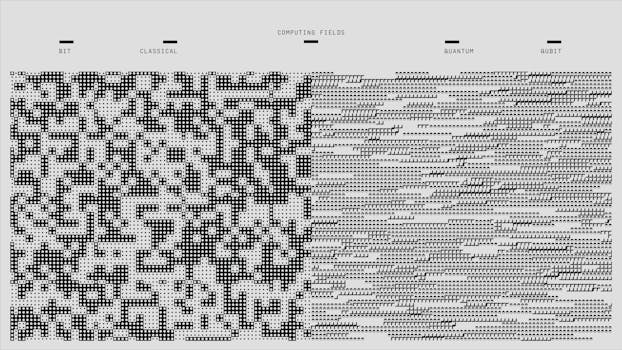Advances in Quantum Computing
Quantum computing represents a significant leap forward in computational technology, poised to transform various industries by solving problems currently beyond the capabilities of classical computers. Unlike traditional binary systems, quantum computers utilize qubits, which can exist in multiple states simultaneously, thanks to the principles of superposition and entanglement.

This unique capability allows quantum computers to process vast amounts of data at unprecedented speeds, making them particularly suited for complex simulations, cryptography, and optimization tasks.
The Fundamentals of Quantum Computing
At its core, quantum computing relies on quantum bits or qubits. Unlike classical bits that represent either a 0 or a 1, qubits can represent both simultaneously due to superposition. This property exponentially increases the computational power compared to classical computers. Additionally, entanglement—a phenomenon where qubits become interconnected and the state of one instantly influences another—enhances this power further.
Quantum gates manipulate qubits through operations akin to logic gates in classical computing. However, these operations are far more complex and can execute multiple calculations at once. The challenge lies in maintaining coherence and minimizing decoherence, where external factors disrupt the quantum state.
For a practical application perspective, consider Shor's algorithm. This algorithm demonstrates how quantum computers could efficiently factor large numbers, posing a potential threat to current cryptographic systems. Such algorithms underline the transformative potential of quantum computing.
Current Advancements and Breakthroughs
Recent years have witnessed remarkable advancements in quantum computing technology. Companies like IBM, Google, and Microsoft are at the forefront, developing more stable and scalable quantum processors. IBM's Quantum Experience platform allows users worldwide to experiment with real quantum computers via cloud access.
Google's Sycamore processor achieved a landmark in 2019 by performing a specific calculation faster than the world's most powerful supercomputer could. This event, termed "quantum supremacy," highlighted the potential of quantum computers to tackle problems beyond classical computation.
Moreover, quantum error correction has seen significant progress. Error rates must be reduced for practical applications, and researchers are developing methods to detect and correct errors without disrupting the quantum state. These efforts are crucial as they pave the way for more reliable and scalable quantum systems.
Potential Applications of Quantum Computing
The potential applications of quantum computing span various fields:
- Cryptography: Quantum computers could break current encryption methods but also lead to new, virtually unbreakable cryptographic techniques.
- Drug Discovery: They can simulate molecular structures more accurately, speeding up drug discovery processes.
- Optimization: Industries like logistics and finance could benefit from optimized routing and investment strategies.
- Artificial Intelligence: Enhanced machine learning algorithms could emerge from faster data processing capabilities.
For example, in drug discovery, traditional methods involve lengthy trials and errors. Quantum simulations can predict molecular interactions more precisely, reducing time and costs significantly.
The Challenges Ahead
Despite significant progress, several challenges remain before quantum computing can achieve widespread adoption:
- Stability: Qubits are highly sensitive to their environment, requiring extremely low temperatures and isolation from external noise.
- Error Correction: Developing robust error correction methods is essential for reliable computations.
- Scalability: Building scalable quantum systems that maintain coherence over larger numbers of qubits is a significant engineering challenge.
The complexity of these challenges requires interdisciplinary collaboration among physicists, engineers, and computer scientists. Institutions worldwide are investing heavily in research to overcome these obstacles and realize the full potential of quantum computing.
A Look at Quantum Computing Companies
The landscape of quantum computing is populated by several key players driving innovation:
| Company | Key Contribution | Notable Achievement |
|---|---|---|
| IBM | IBM Quantum Experience Platform | Cloud-based access to real quantum computers |
| Sycamore Processor | "Quantum Supremacy" milestone in 2019 | |
| Microsoft | Quantum Development Kit (QDK) | A comprehensive toolkit for developing quantum applications |
| D-Wave Systems | Quantum Annealing Technology | Practical applications in optimization problems |
D-Wave Systems focuses on a different approach known as quantum annealing, which is particularly useful for solving optimization problems. Their technology is already being used in various industries for real-world applications.
The Future
The integration of quantum computing with classical systems is also an area of active research. Hybrid models that leverage the strengths of both technologies could provide practical solutions sooner than fully functional standalone quantum computers. Advances in quantum computing promise unprecedented capabilities that could transform industries ranging from cryptography to drug discovery. While challenges such as stability and error correction remain significant hurdles, ongoing research and development efforts by leading companies like IBM and Google are paving the way for practical applications. The continued evolution of this technology will undoubtedly lead to groundbreaking changes in how we solve complex problems and process information. The possibilities that arise from successful implementation are boundless. Overcoming current limitations through innovation and interdisciplinary collaboration, we as a society stand on the brink of a new era defined by the extraordinary potential of quantum computing.